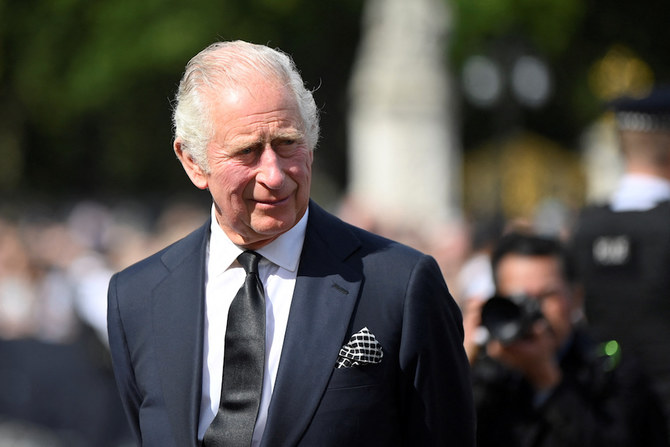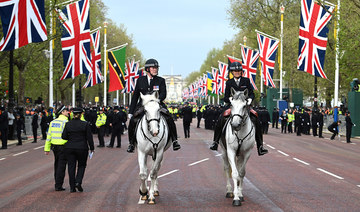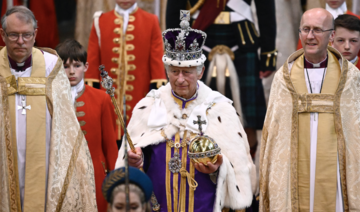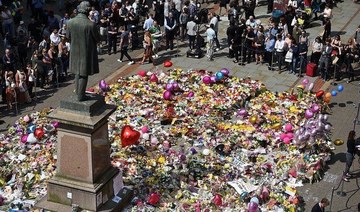LONDON: His moment to shine, his moment to step out of the shadows, has come at last.
Following the death of his mother Queen Elizabeth II last year, the UK’s King Charles III ascended the throne he knew he would inherit from a very young age.
His instant ascension to the head of the British monarchy on Sept. 8 came amid a somber period of mourning and respectful reflection in the UK and globally, but his coronation on May 6 promises to be an altogether more celebratory affair.
As the eyes of the world turn to London for an event bristling with centuries of history, tradition and pageantry, not witnessed for 70 years, so too will those of interested Arab observers from afar and those who call the UK their home.
Given its inextricable links with Britain’s imperial past, the scars of which can still be seen and felt in the Middle East, it is perhaps inspiring that the UK monarchy has for decades cultivated warm ties with the region, especially with the monarchies of the Gulf region.
This has been aided, in no small part, thanks to Charles’ admiration for the Middle East and, in particular, the Islamic religion; he has read the Qur’an, signs his communication with Arab and Muslim leaders in Arabic, and, as Prince of Wales, chose Jordan and Egypt for his first overseas trip after COVID-19 restrictions were lifted.
In a rare break from constitutional rules that demand a strictly apolitical stance, Charles has also openly expressed sympathy for the plight of Palestinians living under Israeli occupation.
It is a region close to his heart.
And for some, Charles’ coronation will mark the beginning of even closer ties between Britain and the Arab world, something symbolized by the warmth and good wishes expressed by regional missions and organizations in the UK.
In an opinion piece for Arab News, Prince Khalid bin Bandar, Saudi Arabia’s ambassador to the UK, wished Charles a “long, prosperous and happy reign” and thanked him for “all he has already done over his long life of service to build bridges between our two nations.”
The UAE’S Ambassador to the UK, Mansoor Abulhoul, extended his “warmest congratulations” to King Charles on behalf of his country, and described the event as “a time of celebration” for everyone in Britain.
“The king’s dedication to environmental protection, tackling inequality, and fostering interfaith relations has been demonstrated throughout his time as HRH Prince of Wales. His passion and conviction are a major asset in his important role (in) representing the British nation,” Abulhoul said, as the UAE prepares to host the upcoming UN Climate Change Conference (COP28) later this year.
“The UAE and UK have always been close allies and partners with a shared history and mutual interests in security, defense, trade, education and the environment,” he added. “But let us also pause to celebrate that we are tied together by something more profound in this critical year of renewal — our royal histories, our personal friendships, and many cultural ties, as well as our common values.”
Husam Zomlot, head of the Palestinian mission in the UK, said he looked forward to working with the king “on resolving the Palestinian issue, an issue for which the UK has a unique historical responsibility and in whose resolution we hope will play a unique and progressive role.”
Commenting on Charles’ “historic visit” to the occupied Palestine territory, he said: “During his trip, he walked through the streets of Bethlehem with Palestinian Christian and Muslim leaders, underscoring not only his message of unity, but also showcasing the multi-faith nature of the Palestinian people.
“We sincerely hope King Charles will visit again as monarch to an independent and free state of Palestine. We join with him in his wish, expressed in 2020, that we, the Palestinian people, should also enjoy freedom, justice and equality,” he added.
Jordan’s ambassador to the UK, Manar Dabbas, described the coronation ceremony as “a new promising era that builds on centuries of a great legacy.” He said his country regards the event as “a beginning of a renewed promising chapter of the strategic bilateral relations between Jordan and the UK — a partnership that entered its second centennial two years ago.”
Highlighting Jordan’s work to host the second largest number of refugees per capita worldwide and its several initiatives to combat climate change, Dabbas added: “It is a moment of victory for international advocates of climate, biodiversity, protecting refugees, promoting civilizations and religious connectivity and coexistence, and advancing humanity.
“Indeed, his majesty’s globally recognized efforts and his unwavering passion pertaining to these issues is a beacon of hope for hundreds of millions around the globe.
“King Charles III played a massive role, even during his previous capacity as Prince of Wales, to fortify this longstanding and deep-rooted partnership (and) I am certain that their majesties King Abdullah II and King Charles III will take our relations to new horizons and levels,” he added.
Sheikh Fawaz bin Mohammed Al-Khalifa, Bahrain’s ambassador to London, said Charles would build on the legacy of Queen Elizabeth II, “who was such a source of strength and inspiration for countless millions around the world.”
He added: “With over two centuries of deep and broad-based cooperation, Bahrain and the UK share a unique and enduring bond, reinforced by the longstanding friendship between the two royal families, I have no doubt that during the reign of King Charles, these ties will strengthen further at all levels.”
Bandar Reda, secretary-general and CEO of the Arab British Chamber of Commerce, said “the accession of the new monarch marks a new era for Britain and for the British people and it underpins the unfaltering unity of the nation.”
Reda added: “The coronation will be eagerly watched by people around the world, including the Arab world where King Charles is greatly respected for his positive role in fostering closer Arab-British relations across all fields.”
Omar Bdour, CEO of the London Arabia Organization, said that Charles “clearly has a love for the Arab world” and “personally values the relationship” with the region.
Bandar Reda, secretary-general and CEO at the Arab British Chamber of Commerce, said the coronation would “mark a new era” for Britain, and would be “eagerly watched by peoples around the world, including the Arab world, where (Charles) is greatly respected for his positive role in fostering closer Arab-British relations.”
And George Kanaan, CEO of the London-headquartered Arab Bankers Association, congratulated the king on his coronation, saying: “As Prince Charles, the king made numerous visits to the Middle East, and we are deeply grateful for the work he has done to strengthen ties between the UK and Arab states, and to enhance our commercial and cultural ties.”
He added: “While we remain saddened by the passing of Queen Elizabeth II, we look forward with optimism and confidence to the reign of King Charles III, and pray that it may be long and happy.”
Reem Alkharji, the chairwoman of the Saudi Students Club in London, said: “On behalf of all the Saudi students studying in London, we wish him a pleasant and prosperous reign, and we look forward to a bright future under his leadership.”
She added: “We are grateful for his support and commitment to the younger generation, and we hope to contribute to the flourishing relationship between Saudi Arabia and the United Kingdom.”
That sense of optimism is shared by UK-based Arabs.
Richard Jabara, a Lebanese-Italian investment banker, plans to be at Westminster Abbey to witness the “iconic moment in British history” and believes Charles will continue the work of his mother in giving the monarchy a solid foundation and Britain a symbol of stability.
“I think there is a lot of respect between King Charles and the Middle East,” he said. “It will be great having a monarch who understands Middle Eastern culture. Hopefully he can inspire more people from the UK and globally to learn about the Middle East,” he added.
Mohammed Al-Derbasti, a Qatari student at London’s City University, told Arab News he would definitely be tuning in to watch the coronation.
“I do believe that King Charles’ admiration for Islam will create a closer bond between the UK and the Middle East,” he said. “His trip to the occupied West Bank and the public show of sympathy are examples of that.”
Palestinian Janan Kawash, a student at University College London, agreed, adding that she believed Charles would leave behind a “more inclusive” Britain to his heir, William, Prince of Wales.
“When Charles visited the West Bank (in 2020) and expressed his sadness over the suffering of the Palestinian people, that was an unprecedented show of support by a Western leader, let alone a British royal family member,” she told Arab News.
Domestically, it is hoped that the king’s “defender of the faith” role as head of the Church of England, coupled with his self-proclaimed commitment to being a “defender of all faiths,” could herald a healing of divisions in a deeply divided British society.
“From his charitable work at the Prince’s Trust and his accepting of different faiths and cultures, I think King Charles’ reign will be known for more understanding between the UK’s ethnic groups and a reduction in hate crime,” Al-Derbasti added.
However, Charles and his reign will not be without detractors, and there are some Arabs living in the UK who share a different outlook. For some, his role as nothing more than a powerless figurehead will make him ineffective in making a genuine impact.
“I personally won’t be watching (the coronation),” Lebanese-British trainee solicitor Yara El-Hage said. “Practically speaking, he won’t have an impact on UK-Middle Eastern relations.”
She added: “Despite his verbal expressions of solidarity with causes across the Arab world, Charles’ role as king is nothing more than symbolic power; he lacks the authority to effect change based on his political views,” she added.
In an era of ever-increasing isolationism and polarization, the rapidly changing and evolving Middle East finds itself at the vanguard of almost every sector, while the UK and the wider Western world continue to face challenge after challenge.
Whatever their opinion of Charles, Arabs from across the region, and those living in the UK, will no doubt keep a watchful eye on how the new monarch guides a Britain — vastly different to the one his mother inherited — through such tests and what sort of role he might play on the global stage.




























